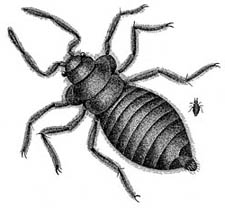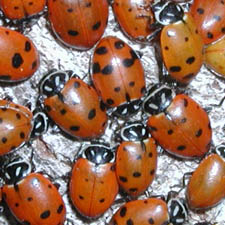Where Did the Word "Bug" Come From?

Finding out exactly where and when words were first used is often not easy. People who specialize in words and their history are called etymologists, which sounds very close to the word used to describe people who study insects - entomologists. So what's the story behind the word "bug?"
The word first shows up in the earliest English translation of the complete Bible. John Wycliffe (c. 1320-1384) led a group who translated the Latin version of the Bible into English. In the translated work the first form of bug appears.
“For whi as `a bugge, either a man of raggis, in a place where gourdis wexen, kepith no thing, so ben her goddis of tree, and of siluer, and of gold.”
In this case the word did not mean insect. It was instead either a hobgoblin or scarecrow. It was not until the 17th century (1601 - 1700) that “bug” began to be used to describe insects. It appears that the first insect linked with the word was the pesky bed bug. These insects would quietly feed on people at night, as if they had been visited by a hobgoblin.

In the 18th century (1701 - 1800), scientist Carl Linnaeus helped establish the naming system that is still in use today. His system of organizing living things by their similarities is known as taxonomy. Insects that became grouped in the same order as bed bugs have since been called “true bugs.”
If you are wondering about the ladybug and if it is a true bug – it isn’t. These insects are actually beetles and have the common name lady beetle. In some cases you will see them called ladybugs. Notice the name is spelled as one word and all true bug names are spelled with two words when linked to the word “bug.”
References:
Merriam-Webster new book of word histories – copyright 1991. Merriam-Webster 544 pages. Page 71
Oxford English Dictionary
Read more about: True Bugs
Bibliographic details:
- Article: Where Did the Word "Bug" Come From?
- Author(s): Dr. Biology
- Publisher: Arizona State University School of Life Sciences Ask A Biologist
- Site name: ASU - Ask A Biologist
- Date published: 6 Oct, 2010
- Date accessed:
- Link: https://askabiologist.asu.edu/where-did-word-bug-come
APA Style
Dr. Biology. (Wed, 10/06/2010 - 19:15). Where Did the Word "Bug" Come From?. ASU - Ask A Biologist. Retrieved from https://askabiologist.asu.edu/where-did-word-bug-come
Chicago Manual of Style
Dr. Biology. "Where Did the Word "Bug" Come From?". ASU - Ask A Biologist. 06 Oct 2010. https://askabiologist.asu.edu/where-did-word-bug-come
Dr. Biology. "Where Did the Word "Bug" Come From?". ASU - Ask A Biologist. 06 Oct 2010. ASU - Ask A Biologist, Web. https://askabiologist.asu.edu/where-did-word-bug-come
MLA 2017 Style
Be Part of
Ask A Biologist
By volunteering, or simply sending us feedback on the site. Scientists, teachers, writers, illustrators, and translators are all important to the program. If you are interested in helping with the website we have a Volunteers page to get the process started.



